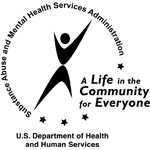SAMHSA Seeking Applications for $131.5 Million for Activities that Advance the National HIV/AIDS Strategy through Behavioral Health
Topics

The Substance Abuse and Mental Health Services Administration (SAMSHA) recently released funding announcements for two programs whose purposes are closely aligned with the National HIV/AIDS Strategy.
“Substance abuse and HIV/AIDS are often interrelated issues and must be addressed in comprehensive ways,” said Gretchen Stiers, Ph.D., Director, Division of Policy Coordination in SAMHSA’s Office of Policy, Planning, and Innovation, and the agency’s HIV/AIDS lead. “These grants will help communities pursue more effective approaches for making HIV testing available to people at risk for or living with HIV and expand access to behavioral health treatment systems for those with substance abuse and co-occurring mental disorders who are most at-risk for or are living with HIV/AIDS.”Targeted Capacity Expansion Program: Substance Abuse Treatment for Racial/Ethnic Minority Populations at High-Risk for HIV/AIDSSAMHSA is now accepting applications under its Targeted Capacity Expansion Program: Substance Abuse Treatment for Racial/Ethnic Minority Populations at High Risk for grants totaling up to $130.5 million over the course of a five-year period. The purpose of this program is to facilitate the development and expansion of culturally competent and effective community-based treatment systems for substance use and co-occurring mental disorders within racial and ethnic minority communities in states with the highest HIV prevalence rates. Community-based organizations (CBOs) and Federally recognized Tribes and tribal organizations in 22 States and Territories with HIV prevalence rates of 270/100,000 or higher are eligible to apply. (A full list of eligible applicants is available at SAMHSA’s grants website.) According to SAMHSA’s grant announcement, the expected outcomes for the program include reducing the impact of behavioral health problems, reducing HIV risk and incidence, and increasing access to treatment for individuals with co-existing behavioral health, HIV, and hepatitis conditions. This program will help ensure those individuals who are at high risk for or have a substance use or co-occurring mental disorder and who are most at-risk for or are living with HIV/AIDS have access to and receive appropriate behavioral health services. The program reflects the National HIV/AIDS Strategy priorities of strategically concentrating resources in areas with high rates of HIV infection, and targeting services and interventions to specific population subgroups at higher risk, such as young minority men who have sex with men.
SAMHSA expects that up to $26.1 million will be available annually to provide up to 52 grants at up to $500,000 per grantee, over the five-year grant period. The actual award amounts may vary, depending on the availability of funds. The application deadline is July 20, 2012.
For more information, read SAMHSA’s press release and view the full grant announcement.
Rapid HIV Testing Supplements for Minority AIDS Initiative and Criminal Justice GranteesUnder a separate funding announcement, FY 2012 Supplements for Rapid HIV Testing, SAMHSA is accepting applications from its Minority AIDS Initiative grantees and Criminal Justice grantees to provide rapid HIV testing, counseling and referral to care. (Read more about the nine eligible cohorts of SAMHSA grantees.) The program will support the NHAS goal of reducing the number of new HIV infections by increasing the number of people who know their HIV status through the provision of HIV rapid testing to high-risk populations. SAMHSA expects that up to $1 million will be available for one year for up to 20 grants at up to $50,000 per grantee. The actual award amounts may vary, depending on the availability of funds. The application deadline is July 13, 2012.
Ed. Note: Read more about SAMHSA, Behavioral Health and the National HIV/AIDS Strategy’s in Dr. Stiers’ prior posts here and here. Also, read our recent post about incorporating rapid HIV testing into substance abuse treatment programs.